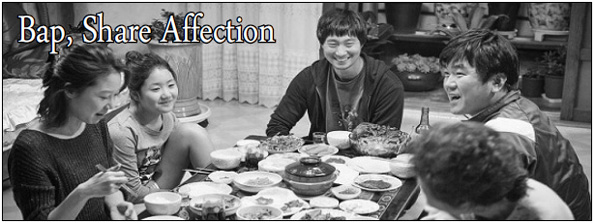
In the movie ‘Aging Family’, when a man, one of the main characters, was hanging himself to death, he got a phone call from his mother. Her first words were, “Are you eating well?” The mother was anxious about his safety because he was living far away from her home. She said the hearty words, “Take care of your health and take a full meal”, so the son gave up suicide.
In Korea, “Have you eaten?” is as common a greeting as “Hello.” This greeting asks the other whether they ate or not and it also contains the kindness of providing their meal if they had not eaten. For a foreigner, it can be regarded as an invasion of privacy, but the meaning of this question is not to interfere in whether they had a meal or not. In Korea, a meal means a lot. Therefore, Koreans call their family members as the other Korean word ‘sikgu’, which means eating mouths.
‘Bap’ has the meaning of ‘meal’ in addition to ‘food made with rice’. In the movie, there was a scene where all of the family members sat at a table and ate together. The main characters, 2 brothers and a sister, fought with each other all the time even though they are family. However, they had a meal together sitting at a table at every meal. There was Korean bean paste stew(Daenjang jjigae), which their mother made, in the middle of the table. They ate the stew putting their spoons together in it and shared the side dishes. The focus here is eating together. When Koreans usually eat, they have separate bowls for rice and soup but share the side dishes. It gives a sense of community, which means taking care of each other by sharing a meal.
These days, it is difficult for family members to have a meal together as each of them is busy with their own lives. However, having a meal is not merely ingesting food. A family reduces their stress and feels comfortable emotionally through the time of eating together. According to the results of the research, a hormone is released when people have a meal. If people have a meal together, the hormone increases and people can feel more mental satisfaction. Thus, Koreans ask about other’s health by inquiring if they had a meal and sometimes share affection by eating ‘bap’ together.
By Kang Hye-min | hm34@cbnu.ac.kr


 All
All Experience
Experience






 Kang Hye-min
Kang Hye-min











